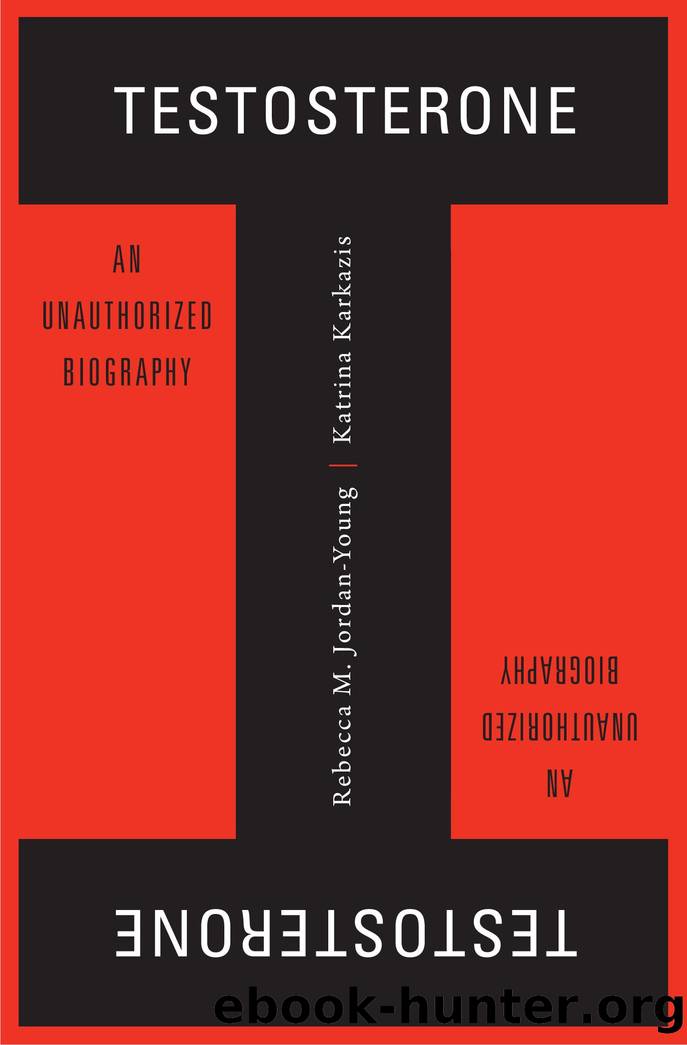Testosterone: An Unauthorized Biography by Rebecca M. Jordan-Young & Katrina Karkazis

Author:Rebecca M. Jordan-Young & Katrina Karkazis [Jordan-Young, Rebecca M. & Karkazis, Katrina]
Language: eng
Format: epub
Tags: Science, Life Sciences, Biology, Social Science, Anthropology, Cultural & Social, Gender Studies
ISBN: 9780674725324
Google: efuwDwAAQBAJ
Publisher: Harvard UP
Published: 2019-01-15T22:36:42+00:00
Racing and Classing Parental Investments
Theories of parental investment and life history strategy are nestled within a broader scientific literature comparing reproduction and sexuality across human populations. The language of âinvestmentsâ and trade-offs between quality and quantity of offspring should already give a clue about where this goes, suggesting that in some groups parents care for their children and in other groups people just indiscriminately reproduce. There is a strong resonance between that idea and racialized and classed narratives of parenting and sexuality. In fact, this is the exact underpinning of the nineteenth- and twentieth-century eugenicistsâ fears of âlowerâ races and classes out-reproducing Europeans. Similarly, against a backdrop that pathologized mother-headed households, twentieth-century scholars used evolutionary theory to scrutinize the emerging âreproductive strategiesâ of children reared in âfather-absentâ families. By the time the challenge hypothesis came on the scene, there was already a long-standing research narrative about parenting that had strong racial and class dimensions.20
To be clear, most studies of parenting and T are done by researchers who do not deliberately racialize parenting in their studies; anthropologists, in particular, generally donât even frame their subjects in terms of race. Instead, they explore T dynamics across or within populations and ethnic groups, where the term âethnicâ is used to refer to specific cultural and linguistic groups that might have distinct patterns of pair bonding and parenting. They use the term âpopulation,â on the other hand, to refer to extremely large, generally geographically based groups, such as ânon-Western,â âWestern,â or âNorth Americanâ men, or to groups differentiated by the prevalence or legal status of polygamy. While none of the anthropological studies we found explicitly suggest that ethnic, regional, or other population patterns for T map onto âracialâ groups, general trends in scientific concepts on race and discursive slippage between âpopulationâ and âraceâ might encourage such readings, especially among those readers who are inclined to think of âethnicâ as a more modern or acceptable word for race. Ramya Rajagopalan and colleagues have pointed out that the concept of a population, understood as a âbounded, genetically differentiated group,â âpermit[s] ideas of race as biology to persist and sanitize[s] the study of human genetic differences in an attempt to diffuse some of the postâWorld War II anxieties around race.â21
To examine the subtle slippage between study specific groups and larger populations, consider Martin Muller and colleaguesâ 2009 comparison of testosterone and fatherhood status in two geographically proximate peoples in Tanzania, the Datoga and the Hadza, the latter of which is widely reported to be the last group of nomadic foragers in the country. After a close comparison of the two groups, the researchers zoom out to consider how their findings might fit into broader global patterns that show T is not reliably related to partnership and parenting in ânon-Western populationsâ: âCross-cultural variation in testosterone responses to marriage and fatherhood could potentially result from differential patterns of investment in mating and parenting effort, even among married fathers.⦠If North American men typically invest more in marital bonds and
Download
This site does not store any files on its server. We only index and link to content provided by other sites. Please contact the content providers to delete copyright contents if any and email us, we'll remove relevant links or contents immediately.
Exploring Deepfakes by Bryan Lyon and Matt Tora(8367)
Robo-Advisor with Python by Aki Ranin(8311)
Offensive Shellcode from Scratch by Rishalin Pillay(6429)
Microsoft 365 and SharePoint Online Cookbook by Gaurav Mahajan Sudeep Ghatak Nate Chamberlain Scott Brewster(5678)
Ego Is the Enemy by Ryan Holiday(5413)
Management Strategies for the Cloud Revolution: How Cloud Computing Is Transforming Business and Why You Can't Afford to Be Left Behind by Charles Babcock(4563)
Python for ArcGIS Pro by Silas Toms Bill Parker(4503)
Machine Learning at Scale with H2O by Gregory Keys | David Whiting(4292)
Elevating React Web Development with Gatsby by Samuel Larsen-Disney(4224)
Liar's Poker by Michael Lewis(3441)
Learning C# by Developing Games with Unity 2021 by Harrison Ferrone(3350)
Speed Up Your Python with Rust by Maxwell Flitton(3312)
OPNsense Beginner to Professional by Julio Cesar Bueno de Camargo(3283)
Extreme DAX by Michiel Rozema & Henk Vlootman(3263)
Agile Security Operations by Hinne Hettema(3190)
Linux Command Line and Shell Scripting Techniques by Vedran Dakic and Jasmin Redzepagic(3174)
Essential Cryptography for JavaScript Developers by Alessandro Segala(3144)
Cryptography Algorithms by Massimo Bertaccini(3084)
AI-Powered Commerce by Andy Pandharikar & Frederik Bussler(3052)
